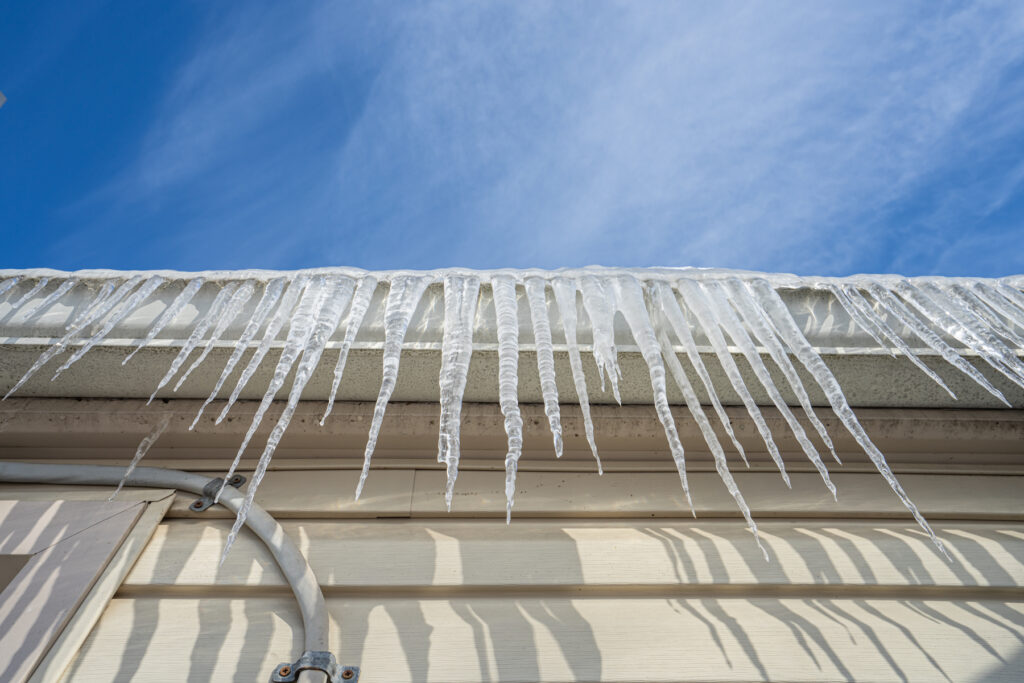The weather we experienced at the end of 2022 was epic. And while it was referred to as a “once in a generation storm,” we all know that that isn’t true. If you managed to dodge issues this time around, it doesn’t mean that the next storm won’t wreak havoc. With that in mind, here are some things you can do now and as the next period of freezing temperatures approach to protect your home, apartment or office.
Outside
- Clean your gutters. Backed-up gutters and “ice dams” near downspouts can allow water to seep into your house.
- Check for dead or damaged branches over your roof. Ice, snow and wind can cause branches to fall and damage your home or cars, or worse, someone on your property. Regularly check and trim any branches before they can cause problems.
- Remove fallen leaves and other debris from stairs, walkways and decks. Wet leaves are nearly impossible to clear, especially if temperatures fall below freezing. Navigating through these leaves can be treacherous and lead to falls.
- Keep your garage door closed during inclement weather. The last thing you want is for water or snow to blow into your garage and freeze, causing damage to stored items. It will also keep your home warmer and cut down on your heating costs. (Note: Doors from a garage to your house are frequently not well insulated, allowing cold air to seep in. Check this door and add weather stripping if needed.)
- Protect faucets, wrap exposed pipes, and empty water hoses. Before cold weather hits, make sure you disconnect any water hoses and empty them fully before storing. Additionally, insulate exposed pipes and faucets by wrapping them in protective material. In a pinch, old newspapers, rags or blankets can do the job too.
Inside
- Install additional insulation. Southern homes are often not adequately insulated for cold weather. Check your attic, basement and crawl spaces to see if they are well-insulated, and if not, consider adding some before the next storm approaches.
- Annually service your heating system. This is a good idea, no matter what the weather brings. But the last thing you want to discover is that your heater isn’t working when a cold front is approaching. Regular HVAC service ensures that the unit is in working order and can give you advance warning if repairs are needed. This includes having your chimney cleaned too.
- Locate your water shut-off valve. If your pipes freeze, it is critical to shut off your water as quickly as possible to prevent or mitigate damage.
- Check – or install – smoke and carbon monoxide detectors. More fires occur in winter than any other season, as well as cases of carbon monoxide poisoning. Make sure your detectors are in working condition, so you don’t fall victim to either scenario.
- Consider adding back-up power. If your power goes out, the temperature in your house can drop quickly. This can lead to pipes freezing in addition to being uncomfortable and unhealthy. A portable power generator can help ensure you have continuous power, but never run one inside your home and carefully follow the manufacturer’s instructions.
- Move anything flammable away from heat sources. Do a quick sweep of all rooms in your house to make sure that all fireplaces, space heaters and wood stoves are given a wide berth.
- Seal any gaps in windows and doors. A surprising amount of cold air can seep in through your windows and doors if not sealed properly. Check all entry points to your home and add caulk or weather stripping where needed to keep the cold weather out.
Additionally, make sure you have everything you need to survive for a while without water or power. This includes keeping bottled water on hand, filling all prescriptions, and buying non-perishable food. Hopefully you won’t need it, but it can be a lifesaver if you do.
While this is a good start, every home is unique and may need additional preparation. And finally, if you do experience damage due to frozen pipes or other winter weather impacts, reach out to us immediately to get the restoration process started. We are here to help!

